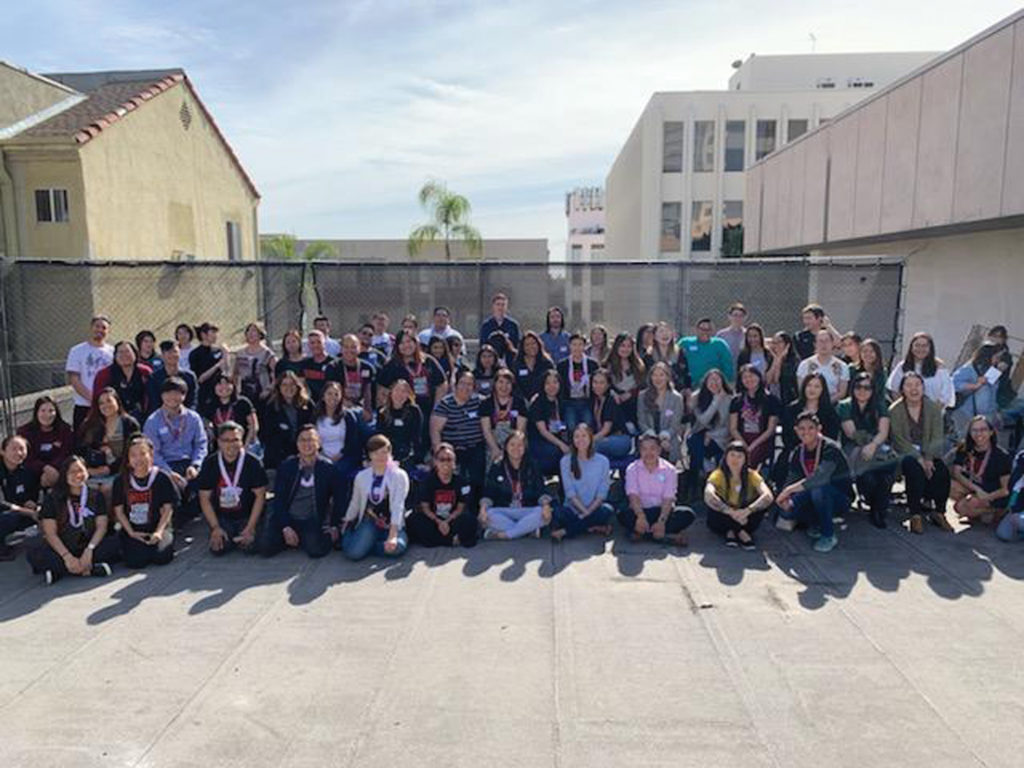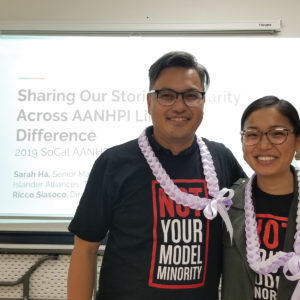“We never know how our small activities will affect others through the invisible fabric of our connectedness. In this exquisitely connected world, it’s never a question of ‘critical mass.’ It’s always about critical connections.” – Grace Lee Boggs
“Four decades after Dr. King’s death, we are a very different nation. We are a nation where the White population will become the minority in the nation’s schools in just a few years. We are a nation where nearly a fifth of public school students come from linguistic minority families. Even though there is no significant effort to desegregate our schools now, thousands of American schools, mostly in the suburbs, are going through racial and ethnic change as Black and Latino families move away from central urban areas and many city schools experience displacement of one minority by another. Since teaching is the one profession that must interact effectively and in great depth with nine-tenths of the nation’s young people, lack of training and support means, at best, lost opportunities for deeper and more effective relationships. At worst, it means being helpless in the face of serious divisions coming into our schools from the outside community. American parents, by very large majorities, want their children to grow up understanding how to relate successfully with all groups in a diverse society. For this to happen, and for our society to avoid projecting into ever larger sectors of suburbia the kinds of poor race relations and resegregation that damaged so many urban neighborhoods, teachers must have the tools to understand and relate to students and parents from all backgrounds and to help children understand the very diverse and changing society they will live in.” – Gary Orfield, The Civil Rights Project at UCLA

A group of about 20 Asian American Native Hawaiian and Pacific Islander (AANHPI) educators and advocates voluntarily organized a summit for Southern California AANHPI educators during the last weekend in January.
The intent was to build community across schools, districts, and identities, deepen its collective understanding of AANHPI experiences with education, and create space to affirm and respond to the needs and challenges.
Nearly 70 attendees, some traveling from as far as Sacramento and San Diego, convened at Bright Star Rise Kohyang Middle School in Koreatown on Saturday, January 26 to engage in the summit’s theme of “Inward, Outward, Onward” as a way to build community, learn from each other, and set the stage for future action.
A highlight of the summit was a focus on deepening the collective understanding of AANHPI experiences with education, and the ways in which AANHPI experiences might be represented in education equity conversations.
“Now, more than ever, our voices are heard, our leadership is seen and convening other folks who have long not seen themselves in famous leadership is an important part of healing. It is an imperative to fully represent the stories and hope the future holds,” said Ruth Le, one of the summit organizers and current special education high school educator.
Nationally, only 2.5 percent of all public school teachers identify as Asian American Native Hawaiian or Pacific Islander, while 6 percent of all students in the LA Unified School District (LAUSD), the nation’s second-largest school district, identify as AANHPI.
The summit organizers believe that Southern California can and should be prime space for its kids and families to receive an affirming and responsive education, which starts with teachers understanding the unique role they play given their own identity in relationship to their students. By creating a space to affirm and respond to needs and challenges experienced by participants, the summit organizers hope to set the stage for a future of community-building and collective action.
“Growing up, I didn’t have many role models to look up to who looked like me. Spaces like these guided me in finding my leadership voice and political identity — a space of transformation and community,” shared Jacqulyn Whang, a current educator with Compton Unified School District who is also leading a yoga workshop at the summit.
In America, analyses of racial inequities in education typically focus on disparities between the experiences of African-American or Latin@/x kids (colloquially, “black and brown” kids) and their white peers. Framing the fight against educational inequities in this way renders invisible the needs and contributions of AANHPI communities in any of that work, according to research conducted by Benjamin Chang on Asian Americans and education.
For a moment, it took me back to 1980s with organizations like Asian Americans Advancing Justice (formerly Asian Law Caucus, Asian Pacific American Legal Center) and Asian Pacific Americans in Higher Education (APAHE) who were focused on addressing social inequalities through civil rights work and training leaders in higher learning.
I remember attending education conferences of APAHE and leaving inspired. It was empowering to listen to conference speakers: black, brown and white professors who had stellar academic achievements in the field of education, know how to teach from the ground up, and are able to speak from a wealth of experience, from praxis or actual practice, what it takes to teach with equity-centered leadership and fairness and to develop curriculums. They invited community leaders as well to speak on best practices.
They were not just buzzwords, but APAHE’s conference workshops reflected teaching and leadership development content, borne out of actual leadership and educational experiences for decades and more.

It paralleled what I saw in SoCal AANHPI Educators Summit presenters, Sarah Ha and Ricco Siasoco, each having 15 years plus experiences of teaching and advocacies. It was a unique combination of seeing a Ricco, a former professor at Boston College presenting with his former student Sarah. They had a positive mindset, ability to influence others with their presentations, who work with respect and humility for those who attended the summit workshop.
In a short period of time, they got folks to reflect on their past, position themselves in a collective timeline prepared by LEAP (Leadership Education for Asian Pacifics), an organization we had supported in the past. LEAP timelines for Asian Americans, Native Hawaiians and Pacific Islanders first dated back to June 9, 1880 when 148 Japanese were in the continental United States.
However, this session also illuminated how the AANHPI community is missing a complex and comprehensive AANHPI history. I noticed that the timeline glaringly lacked the history of Filipinos Americans in Louisiana since the 1700s, who originated the dried shrimp industry. They were Filipino sailors under the rule of the Spanish who escaped the Spanish galleons to establish the fishing village of Saint Malo in Louisiana, “Filipinos pioneered the dried shrimp industry, the predecessor of the modern shrimp industry,” says Robert Romero, the President of the Filipino Louisiana Historical Society. “There [was] no refrigeration then, and after you have been catching all these shrimp, so you have to just dry them.” Manila Village, Bassa Bassa and other Gulf Coast Filipino settlements would later be credited. (Source: Ricco Siasoco’s slide presentation at the Summit, Jan. 2019).
This caught my attention that one of the tenets of this summit’s session on ‘Sharing our Stories: Solidarity Across AANHPI Lines of Difference’ is – “We cannot understand U.S. history without understanding Asian American history,” Dr. Erica Lee, author of the Making of Asian Americans. My challenge to the summit organizers is to contact LEAP and correct this significant milestone omission.
A multicultural summit of educators
Equally valuable in the exercise is an impression that we are all coming from diverse backgrounds, previously census-profiled at 25 Asian American groups in the 1980s, to now 48 diverse groups, speaking 300+ languages, according to Ha, who is also the Senior Managing Director of National Asian American and Pacific Islander Alliance at Teach for America.
What was heartening was that the SoCal AANHPI Educators Summit gathered 90 teachers from different parts of California, and were from these cultural backgrounds: Chinese, Filipino, Korean, Japanese, Vietnamese, Taiwanese, Indian, Thai, Cambodian, Laotian, Native Hawaiian, and Pacific Islander.
The use of technology assisted in the profile assessments of these attendees. The diversity of experiences and backgrounds represented reflected the need for AANHPI teachers to have stronger self-awareness of their identities and impact. Workshop leaders Ha and Siasoco emphasized that those represented also must be cognizant of many other groups are not represented and their narratives still need to be included, as their voices.
The erasure of AANHPI folks from education conversations also means that AANHPI educators can often be ill-prepared to think critically about the impact of their identities in the relationship to their students and schools. According to an article from the Harvard Graduate School of Education, AANHPI educators often have a less robust foundation of research from which to interrogate the impact of their identities on students of all races and ethnicities.
The summit provided spaces for these young teachers to articulate their voices, to share their past histories and to have the agency to do so – meaning they are empowered and presumed to have the “critical literacy.” That would mean having the facility to critically process the information they have absorbed, and apply logically to present situations and find solutions and address the problems. Schools can better serve all students if teachers more deeply understood AANHPI needs, and ways to address these challenges using tools such as “critical literacy.”
The erasure of AANHPI communities reinforces the “model minority myth,” a (false) belief that allegations of systematic racism (voiced initially by African-Americans) must be unfounded because Asians have been able to leverage hard work toward their American success.
In this case, when inequities facing AANHPI folks are not given space in education conversations, we perpetuate the incorrect notion that AANHPI communities do not face challenges in education. This assumption of AANHPI earned immunity against inequity both disservices AANHPI youth and fuels excuses that allow the needs of non-AANHPI youth of color to be ignored.
Here’s hoping that the summit organizers and participants continue to fuel their momentum to address these inequities in this generation.
* * *
Prosy Abarquez-Delacruz, J.D. writes a weekly column for Asian Journal, called “Rhizomes.” She has been writing for AJ Press for 10 years. She also contributes to Balikbayan Magazine. Her training and experiences are in science, food technology, law and community volunteerism for 4 decades. She holds a B.S. degree from the University of the Philippines, a law degree from Whittier College School of Law in California and a certificate on 21st Century Leadership from Harvard’s Kennedy School of Government. She has been a participant in NVM Writing Workshops taught by Prof. Peter Bacho for 4 years and Prof. Russell Leong. She has travelled to France, Holland, Belgium, Japan, Costa Rica, Mexico and over 22 national parks in the US, in her pursuit of love for nature and the arts.






